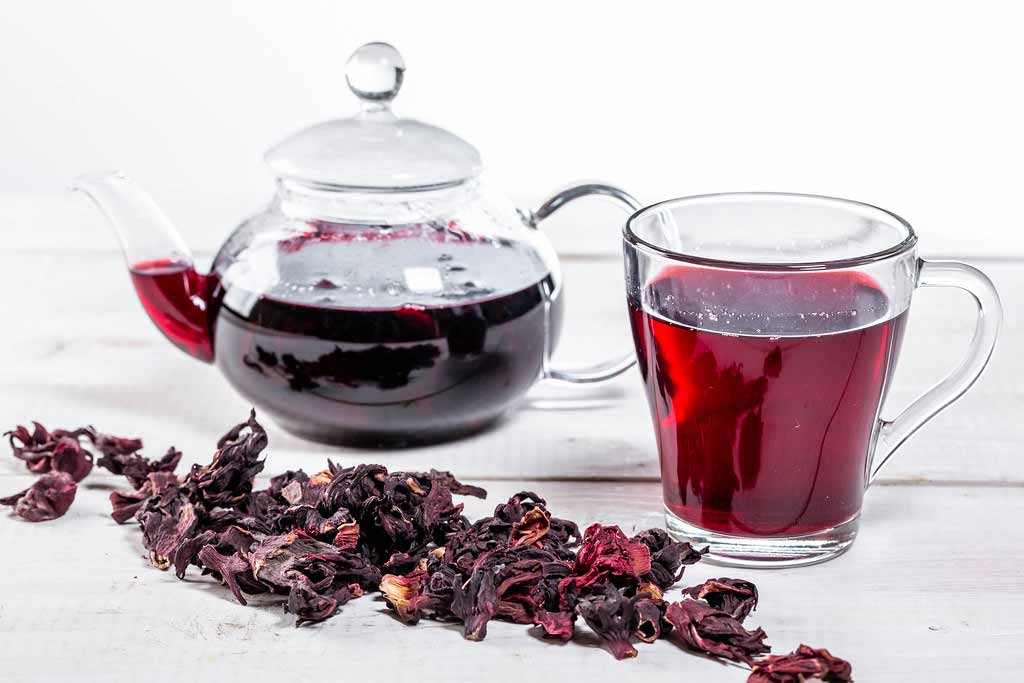Tea and gut health, imagine this: you’ve just finished a delicious but perhaps slightly heavy meal. A rumble in your tummy and a vague feeling of discomfort settle in. Instinctively, you reach for a warm, comforting cup of tea. This age-old practice of sipping tea for digestive woes isn’t just a grandma’s tale – science is starting to shed light on the potential connection between tea and gut health.
For centuries, different cultures around the world have relied on various teas for their soothing and healing properties. From the delicate green teas revered in China to the robust black teas favored in Britain, the world of tea offers a vast array of flavors and potential benefits. But what exactly is the science behind the idea that tea can contribute to a happy gut?
This article delves deep into the fascinating world of tea and gut health. We’ll embark on a journey to understand the complex ecosystem within our gut, the role of the gut microbiome, and how different tea types might influence its health. We’ll explore the current state of scientific research on this topic, acknowledging both promising findings and limitations. Finally, we’ll offer practical tips on incorporating tea into a gut-healthy lifestyle, equipping you to harness the potential benefits of this ancient beverage.
Here’s a roadmap for our exploration:
- The Gut Microbiome: Unveiling the Microscopic Marvels Within – We’ll delve into the fascinating world of the gut microbiome and its crucial role in digestion, immune function, and overall health.
- Tea Time for the Gut? Exploring Potential Benefits – We’ll explore different tea types, such as green tea, black tea, and herbal teas, and uncover the science behind their potential gut-friendly properties.
- Science on the Steep: Unveiling the Research Landscape – We’ll take a critical look at current scientific research on tea and gut health, analyzing findings and limitations.
- A Brewing Future: Looking Ahead in Research – We’ll discuss the exciting possibilities for future research in this developing field.
- Steep Your Way to a Happy Gut: Practical Tips – We’ll provide practical guidance on incorporating tea into your gut-healthy routine, from choosing the right tea to brewing techniques.
- Conclusion: A Cup of Wellbeing – We’ll wrap up by summarizing the potential of tea for gut health and emphasizing its role within a holistic approach to well-being.
So, grab your favorite mug, steep a cup of curiosity, and join us as we explore the intriguing connection between tea and gut health!
The Hidden World Within: Understanding Gut Health and Microbiome
Have you ever stopped to consider the trillions of tiny tenants residing within your digestive system? These microscopic marvels, collectively known as the gut microbiome, play a crucial role in our overall health and well-being. Imagine a bustling metropolis within your gut, teeming with a diverse population of bacteria, fungi, and other microbes. These tiny organisms work tirelessly to maintain a healthy balance in your digestive system, impacting everything from digestion and nutrient absorption to immune function and even mood.
A Microscopic Marvel: Unveiling the Gut Microbiome
The gut microbiome is a complex ecosystem comprised of trillions of microorganisms, with estimates suggesting there are even more bacterial cells in our gut than there are human cells in our entire body! These microbes come in a staggering variety, with hundreds of different species working together to perform essential functions. Some gut bacteria specialize in breaking down complex carbohydrates that our bodies can’t digest on their own, while others produce essential vitamins like vitamin K and B vitamins. The gut microbiome also plays a crucial role in training our immune system to distinguish between friend and foe, helping to defend us against harmful pathogens.
Think of your gut microbiome as a microscopic orchestra, with each bacterial strain playing a unique and vital role in the symphony of your digestive health. When this orchestra is in harmony, a beautiful melody of well-being plays out. However, when the balance is disrupted, it can lead to a cacophony of digestive woes.
The Power of Balance: A Well-Conducting Microbiome
A balanced gut microbiome is essential for maintaining a healthy digestive system. Here’s how these tiny tenants contribute to our overall well-being:
-
Digestive Dynamos: Certain gut bacteria specialize in breaking down complex carbohydrates like fiber, which our bodies can’t digest on their own. By fermenting these fibers, they produce beneficial short-chain fatty acids that nourish the cells lining our gut and contribute to overall gut health.
-
Nutrient Ninjas: The gut microbiome plays a vital role in nutrient absorption. Certain bacteria help us absorb essential vitamins and minerals from the food we eat, ensuring our bodies receive the building blocks they need to function properly.
-
Immune Instigators: The gut microbiome acts as a training ground for our immune system. By interacting with the diverse range of microbes in our gut, our immune system learns to distinguish between harmless bacteria and harmful pathogens, helping to keep us healthy and ward off illness.
A balanced gut microbiome is like a well-conducted orchestra, each microbe playing its part to create a symphony of digestive harmony. However, various factors can disrupt this delicate balance, leading to disharmony that can manifest as digestive problems, bloating, and even contribute to other health concerns.
Factors Affecting Gut Health: Maintaining the Harmony
Just like any complex ecosystem, the gut microbiome is susceptible to disruption. Here are some factors that can throw your microscopic orchestra out of tune:
-
Diet: A diet high in processed foods, sugar, and unhealthy fats can negatively impact the gut microbiome. These foods tend to promote the growth of harmful bacteria while starving the beneficial ones. On the other hand, a diet rich in fruits, vegetables, and whole grains provides the nourishment these beneficial bacteria need to thrive.
-
Stress: Chronic stress can wreak havoc on your gut health. When you’re stressed, your body releases hormones that can disrupt the delicate balance of bacteria in your gut. Finding healthy ways to manage stress, such as yoga or meditation, can contribute to a healthier gut microbiome.
-
Antibiotics: While antibiotics are lifesavers when it comes to fighting infections, they can also have a collateral effect on your gut microbiome. Antibiotics don’t discriminate – they kill both good and bad bacteria. While taking antibiotics is sometimes necessary, it’s important to support your gut health afterwards by consuming probiotic-rich foods or supplements.
-
Certain Medications: Some medications, like antacids, can also disrupt the gut microbiome. If you’re concerned about the impact of a medication on your gut health, talk to your doctor.
By understanding the factors that can disrupt gut health, we can take steps to nurture a balanced and thriving gut microbiome. In the next section, we’ll explore ways to promote gut health through dietary choices, lifestyle habits, and even the power of a steaming cup of tea!
From Leaf to Gut: Exploring Tea Types and Potential Benefits
For centuries, tea has been a beloved beverage enjoyed for its comforting warmth, invigorating flavors, and rich cultural traditions. But beyond the soothing sip and delightful aroma lies a world of potential benefits for our overall well-being, including our gut health. Intrigued? Let’s embark on a journey to explore the fascinating connection between tea and our digestive system, delving into the potential superpowers of different tea types.
Black Tea’s Bioactive Bounty: A Boon for the Gut
Black tea, the robust and energizing hero of the tea world, might hold some hidden gems when it comes to gut health. Black tea is rich in polyphenols, a category of plant-based compounds known for their antioxidant and anti-inflammatory properties. These polyphenols may play a role in promoting the growth of beneficial gut bacteria, which are crucial for maintaining a healthy digestive system.
Prebiotic Powerhouse: Black tea might also offer prebiotic properties. Prebiotics are essentially food for good bacteria in our gut. By providing sustenance for these beneficial microbes, black tea may contribute to a thriving gut microbiome, which is essential for optimal digestion and overall health.
Important Note: While research on the specific impact of black tea on gut health is ongoing, early studies suggest potential benefits. It’s important to consult with a healthcare professional if you have any specific gut health concerns.
Green Tea’s Anti-Inflammatory Power: Taming the Gut’s Fire
Green tea, another powerhouse in the tea world, boasts a unique profile of health benefits. One of the key components of green tea is its abundance of epigallocatechin gallate (EGCG), a potent antioxidant with anti-inflammatory properties. Chronic inflammation in the gut has been linked to various digestive issues. Green tea’s potential anti-inflammatory properties may play a role in reducing gut inflammation and promoting a calmer digestive environment.
Beyond Inflammation: Research suggests that green tea may also help regulate gut motility, which is the movement of food through the digestive system. This can contribute to a smoother digestive experience and potentially alleviate issues like constipation or diarrhea.
Remember: As with black tea, more research is needed to fully understand the specific impact of green tea on gut health. However, the presence of anti-inflammatory compounds and its potential to regulate gut motility make green tea a promising candidate for supporting a healthy digestive system.
Herbal Tea’s Diverse Offerings: A Treasure Trove for Digestion
The world of herbal teas offers a treasure trove of potential benefits for gut health, with each variety boasting its own unique properties:
-
Ginger Tea: Ginger tea has long been a traditional remedy for nausea and indigestion. Ginger’s active compounds may help soothe the digestive tract and alleviate nausea, vomiting, and stomach discomfort.
-
Peppermint Tea: Peppermint tea is known for its refreshing aroma and cooling properties. Studies suggest that peppermint oil, a key component of peppermint tea, may help relax the muscles in the digestive tract, potentially relieving symptoms of irritable bowel syndrome (IBS) like bloating and cramping.
-
Chamomile Tea: Chamomile tea is renowned for its calming and relaxing properties. While its impact on gut health is still being explored, chamomile tea’s potential stress-reducing effects may indirectly benefit digestion, as stress can sometimes exacerbate digestive issues.
Exploring the Options: This is just a glimpse into the diverse world of herbal teas and their potential gut-supporting properties. Other options like dandelion root tea, fennel tea, and slippery elm tea are also worth exploring, each with its own unique set of potential benefits.
Remember: Herbal teas are generally safe for most people to consume. However, it’s always a good idea to consult with a healthcare professional before incorporating any new herbal remedy into your routine, especially if you have any underlying health conditions or are taking medications.
A Note on Fermentation: The Probiotic Power of Kombucha
While not technically a tea, kombucha deserves a mention in our exploration of gut-friendly beverages. Kombucha is a fermented tea drink that boasts the presence of probiotics, which are live bacteria that contribute to a healthy gut microbiome. These beneficial bacteria may help improve digestion, boost the immune system, and even aid in nutrient absorption.
Exploring the World of Kombucha: Kombucha comes in a wide variety of flavors, making it a delicious way to potentially add a probiotic boost to your diet. However, it’s important to choose kombucha that is properly fermented and stored and to consume it in moderation, especially if you’re new to fermented beverages.

Unveiling the Evidence: A Look at Scientific Research
The whispers have been swirling for years – could that steaming cup of tea you hold in your hands be doing wonders for your gut health? Intriguing research suggests a potential connection between tea consumption and a thriving gut microbiome, the remarkable community of trillions of bacteria residing within our digestive system. Let’s delve into the fascinating world of scientific exploration to see what the evidence reveals.
Early Promise: A Glimpse into the Gut-Tea Connection
The story of tea and gut health begins with early research that peeked behind the curtain of this intriguing connection. Studies have shown that tea consumption, particularly green tea, might influence the composition of gut bacteria. Our gut microbiome plays a crucial role in digestion, immune function, and even mood regulation. The idea that a simple cup of tea could potentially influence this complex ecosystem is both exciting and promising.
Green Tea and the Bacterial Balance: Green tea, with its abundance of health-promoting polyphenols, has been a key player in this area of research. Some studies suggest that green tea consumption might promote the growth of beneficial bacteria like Bifidobacteria and Lactobacillus, while potentially reducing the growth of less-friendly bacteria. This shift in the bacterial balance within the gut could contribute to improved digestion, reduced inflammation, and even a stronger immune system.
Beyond Green Tea: While green tea has received much of the initial research focus, other tea types might also hold gut-health benefits. Studies are exploring the potential of black tea, herbal teas like chamomile and peppermint, and even fermented teas like kombucha to influence gut bacteria composition.
Important to Remember: It’s crucial to understand that these early studies are just the beginning. The research is ongoing, and more investigation is needed to establish definitive cause-and-effect relationships between tea consumption and gut health.
Challenges and Limitations:Sifting Through the Evidence
While the initial research on tea and gut health is promising, there are limitations to consider. Many of the existing studies are observational, meaning they simply observe tea consumption habits and gut bacteria composition in a group of people. This doesn’t necessarily prove that tea directly causes changes in gut bacteria.
Individuality Matters: Another challenge lies in the incredible diversity of the human gut microbiome. What works wonders for one person’s gut bacteria might have little to no impact on another. Factors like diet, lifestyle, and genetics all play a role in shaping our unique gut communities.
The Need for More Research: Larger, controlled clinical trials are needed to truly understand the impact of tea on gut health. These studies would involve dividing participants into groups, with some consuming tea regularly and others acting as a control group. This more rigorous approach can help establish a clearer cause-and-effect relationship.
Despite the limitations, the ongoing research into tea and gut health paints an exciting picture. Scientists are actively exploring the potential mechanisms by which tea might influence our gut bacteria.
The Future of Tea and Gut Health Research: Unveiling the Mechanisms
The scientific quest to understand the connection between tea and gut health doesn’t stop here. Researchers are actively exploring the specific mechanisms by which tea might influence the trillions of tiny residents within our digestive system. Here are some intriguing areas of investigation:
-
The Power of Polyphenols: Tea is rich in polyphenols, natural compounds with antioxidant and anti-inflammatory properties. These polyphenols might interact with gut bacteria in beneficial ways, promoting the growth of good bacteria and reducing inflammation in the gut.
-
Prebiotics at Play: Some teas, particularly green tea and certain herbal teas, might contain prebiotics – non-digestible fibers that act as food for our beneficial gut bacteria. By providing these helpful bacteria with nourishment, prebiotics can promote their growth and activity within the gut.
-
The Gut-Immune Connection: A healthy gut microbiome is linked to a robust immune system. Research is exploring how tea consumption might influence the gut-immune axis, potentially leading to improved immune function and reduced risk of chronic diseases.
As scientists continue to delve deeper into the world of tea and gut health, exciting discoveries are sure to unfold. While conclusive evidence is still emerging, the early research paints a promising picture for those who enjoy a steaming cup of tea. Remember, a healthy gut is essential for overall well-being, and incorporating tea into a balanced diet alongside other gut-friendly practices can be a delightful step towards a healthier you.
Beyond the Hype: Practical Tips for a Gut-Healthy Lifestyle
The world of gut health can be a whirlwind of information, with new trends and miracle cures popping up all the time. While tea has shown promise in supporting gut health, it’s important to remember there’s no single magic bullet. Let’s explore some practical tips that, when combined with your tea habit, can contribute to a thriving gut microbiome.
Quality Matters: Sourcing the Best for Your Belly
When it comes to tea and gut health, quality truly matters. Just like choosing fresh, local ingredients for your meals benefits your overall health, opting for high-quality tea leaves can maximize the potential gut-supporting benefits. Here’s why quality matters:
-
Potency of Compounds: High-quality teas boast a higher concentration of beneficial compounds like polyphenols, antioxidants, and prebiotics. These compounds are believed to play a role in promoting a healthy gut environment. Think of them as tiny cheerleaders for your gut bacteria!
-
Freshness Matters: Just like any other food product, the fresher the tea, the better. Freshly sourced tea leaves tend to have a higher concentration of beneficial compounds compared to older, pre-packaged teas. Imagine the difference between a crisp, vibrant apple and one that’s been sitting on the counter for days. The fresher option offers a higher concentration of nutrients, and the same goes for tea!
-
Avoiding Contaminants: Lower quality teas may contain higher levels of contaminants like pesticides or mold. These contaminants can potentially disrupt the delicate balance of your gut microbiome. By choosing high-quality, well-sourced teas, you can minimize your exposure to these unwanted elements.
Finding the Good Stuff: So, how do you find high-quality tea? Here are a few tips:
-
Look for reputable tea shops: These shops often source their teas directly from growers and prioritize quality. They can also offer guidance on selecting the right tea for your gut health goals.
-
Explore online retailers: Several online retailers specialize in high-quality loose-leaf teas. Look for vendors with excellent customer reviews and transparent sourcing practices.
-
Read labels carefully: Pay attention to the origin of the tea leaves, processing methods, and any added ingredients. Choose organic teas whenever possible to minimize exposure to pesticides.
By investing in high-quality tea, you’re not just indulging in a delicious beverage – you’re making a conscious choice to support your gut health in the best way possible.
Moderation is Key: Finding Your Sweet Spot
While tea offers a wealth of potential benefits, moderation is key. Here’s why:
-
Too Much of a Good Thing: Excessive tea consumption can have unintended consequences. For example, too much black tea can interfere with iron absorption. It’s important to listen to your body and find a tea consumption level that feels good for you.
-
Variety is the Spice of Life (and Your Gut): Different teas offer different gut-supporting benefits. Experiment with a variety of teas throughout the week to ensure your gut microbiome has access to a diverse range of beneficial compounds. Fitness – Meditation – Diet – Weight Loss – Healthy Living – Yoga
-
Listen to Your Body: Pay attention to how you feel after consuming tea. If you experience any discomfort, such as stomach upset or anxiety, it might be a sign that you’re consuming too much or that a particular type of tea doesn’t agree with you. In such cases, adjust your tea intake or consult a healthcare professional for personalized guidance.
Remember, a balanced approach is key. Enjoy your cup (or two) of tea each day, but be mindful of moderation and listen to your body’s cues.
Gut Health Synergy: A Holistic Approach
While tea can be a valuable tool in your gut health toolbox, it’s important to remember it’s not a standalone solution. For a truly thriving gut microbiome, consider these additional practices:
-
A Balanced Diet: Nourish your gut with a diet rich in fruits, vegetables, whole grains, and lean proteins. These foods provide essential prebiotics (food for your good gut bacteria) and fiber, which further supports a healthy gut environment.
-
Stress Management: Chronic stress can wreak havoc on your gut health. Finding healthy ways to manage stress, such as yoga, meditation, or spending time in nature, can significantly benefit your gut microbiome.
-
Adequate Sleep: Just like the rest of your body, your gut needs adequate sleep to function optimally. Aim for 7-8 hours of quality sleep each night to allow your gut to repair and regenerate.
By combining a mindful tea habit with a balanced diet, stress management practices, and sufficient sleep, you’re creating a holistic approach to nurturing a healthy and thriving gut microbiome.
Final thought: A Promising Path Forward
The research on tea and gut health is still in its early stages, but the initial findings are undeniably intriguing. While more robust studies are needed to fully understand the cause-and-effect relationships, the potential benefits of tea for gut health are certainly worth exploring. Tea, Coffee, Energy Drinks, Juice, Beverage, Smoothie, and more
As we eagerly await further scientific exploration, it’s important to remember that a healthy gut thrives on a holistic approach. Incorporating tea alongside a balanced diet rich in fiber, fermented foods, and prebiotics, while managing stress and getting enough sleep, can create a thriving gut environment.
So, the next time you reach for a cup of tea, remember – you might not just be soothing your taste buds, but also nurturing the trillions of tiny residents within your gut, paving the way for a happier and healthier you. After all, a healthy gut is a foundation for overall well-being, and a steaming cup of tea can be a delightful addition to your journey towards a healthier you.
Other Interesting Articles
- 20 Proven Health Benefits of Drinking Tea Before A Meal
- How Drinking Tea Can Boost Your Smoking Cessation Journey
- 21 Proven Health Benefits of Drinking A Cup of Tea At Night
- 19 Proven Health Benefits of Drinking Green Tea Before Bed
- 21 Proven Health Benefits of Drinking Tea Before A Meal
- 22 Proven Health Benefits of Drinking Milk Everyday for Men
- 20 Health Benefits of Drinking Milk Everyday for Weight Loss
- Irish Breakfast Tea vs English Breakfast Tea: Which is Better?
- Darjeeling Tea vs Green Tea: Comparison and Differences
- 18 Health Benefits of Drinking Milk Everyday for Weight Gain
- 21 Benefits of Drinking Milk Everyday for Skin and Hair
- 25 French Lavender Earl Grey Tea Health Benefits, Side Effects
- 18 Nilgiri Tea Health Benefits, How to Make, Side Effects
- 20 Proven Health Benefits of Drinking Milk in the Morning
- 18 Coco Loco Black Tea Health Benefits, Recipe, Side Effects
- 20 Yunnan Tea Health Benefits, How to Make, Side Effects
- 21 Lychee Black Tea Health Benefits, Recipe, Side Effects
- 20 Assam Breakfast Tea Health Benefits, Recipe, Side Effects
- 21 Earl Grey Blue Flower Tea Health Benefits, Side Effects
- 20 Health Benefits of Drinking Tea While Stressed & Anxious



